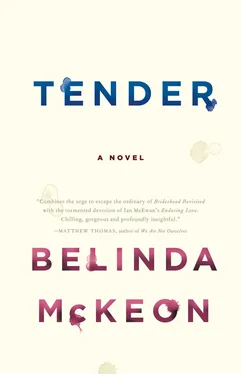“Yeah, she’s so mean to Peter,” Ellen said, leaning back against the wall. “But I actually didn’t see that episode. I can’t believe she said that to him.”
“Yeah, I know,” Catherine said, shaking her head, and then they both looked, with perfect, calm-eyed innocence, to the door, where their father stood.
“You’re home,” he said, with a nod.
“I’m home.”
“What do you think of your new room?”
“Oh,” Catherine said, looking around; Ellen had been so eager to get all of her news that there had barely been a chance to examine the new space that the extension had made of their bedroom, or to remark on it. It was much bigger than their old room had been, and painted in more sophisticated, adult-looking colors, and the bunk beds had been split apart, and were single beds now, covered in quilts of a diaphanous fabric, and Ellen’s desk, neat and ordered and piled with notebooks and folders, stood in one corner. “It’s lovely,” she said, and their father nodded again.
“Very good. Well, I think your dinner’s ready up here,” he said, and he stepped back out of the room and closed the door again; they heard his tread on the corridor.
“I hear you’re havin’ sex with old fellas now, Catherine,” Ellen said, in an imitation of their father’s low, careful tone. “Very good.”
“Oh, God, shut up,” said Catherine, laughing, her head in her hands.
* * *
The following night, in the kitchen of Murphy’s, her grandfather’s local, Catherine and her mother and her aunts made hundreds of sandwiches, and from her seat in front of the television, old Mary Murphy kept one eye on Kenny Live and the other on the women who were slicing tomatoes and going through packets of ham. Like everyone who Catherine met with down home now, she commented on how much Catherine had changed, on how she had grown, as though this was an achievement in itself, and she asked the same questions that people down home always asked.
“You’ll marry in it, so,” she said, nodding to the television, after Catherine had confirmed that, yes, she did like living in Dublin. Catherine coughed out a laugh, and looked to her mother for a mirroring of her own amusement, but her mother was not looking at her; her mother’s hands had, for a moment, gone still, and she was staring at the bread piled in front of her on the chopping board.
“You’ll marry in Dublin,” Mrs. Murphy said again, but this time it was not Catherine’s mother who reacted, but her aunt Fidelma.
“Oh, do not, Catherine,” she said, wrinkling her face into a grimace. “If you know what’s good for you.”
“Sure you don’t know Dublin,” her other aunt, Monica, said.
“I’m not talking about Dublin,” Fidelma said, working a bread knife through a tower of salad sandwiches. “I’m talking about riding.”
“Fidelma!” Monica and Catherine’s mother spluttered in unison.
“Ride all around you, Catherine,” Fidelma said emphatically, “and don’t bother your arse marrying any one of them. That’s my advice to you.”
“Jesus tonight!” Catherine’s mother said, but along with Monica and Mrs. Murphy, she was creased up now with laughter.
Fidelma pointed her knife straight at Catherine. “Don’t mind these ones, Catherine,” she said. “I’m not joking you. When you’re my age you’ll know that I wasn’t joking you. I mean it. Ride. All. Around You.”
Catherine tried for laughter herself, to match the gasps and shudders of the other women, but she was too mortified, felt too paralyzed in the spotlight; all she managed was a wheezing noise and a jerking of her shoulders. “It’s not really an option,” she said.
“Make it an option,” Fidelma pointed again.
“Jesus, Fidelma,” Catherine’s mother said. “Will you concentrate on the bloody sandwiches.”
“This is what you’ll find yourself doing, Catherine, I’m warning you,” Fidelma said. “Concentrating on the sandwiches.”
“Young people have great options these days,” Mrs. Murphy said almost dreamily from her armchair. “Great opportunities above in Dublin, I’d say, Catherine.”
Which started them all off again, really roaring laughing this time, bent low over the table, and Catherine standing in the middle of them, staring at a bowl of hard-boiled eggs. “Well,” she said, to Mrs. Murphy, “I suppose, there’s always something going on.”
“Ride them backwards,” Fidelma interjected.
Dancing. They all knew how to dance. Waltzes. Fox-trots. Jives. There was a confidence to them as they spun each other, moved with each other. But they never, Catherine noticed, looked into one another’s eyes. They did not seem awkward in this; they seemed, on the contrary, quite happy. They talked to each other without looking one another in the eye, and they laughed together, and they met the eyes of other dancers, other couples, but never one another. Catherine remembered her mother coming home, once, from a dinner dance, giving out yards about the parents of a boy Catherine had gone to school with — they were rich, they lived in an enormous house on the outskirts of the town, they always sat, after Mass had finished, in their pew and talked to one another, the whole family, gossiping and chattering like people who were very glad of the chance to catch up with each other. When this couple had danced, apparently, they had looked at one another, smiling, as they did so, and Catherine’s mother had considered this a deeply ridiculous, almost tacky, display; in the kitchen the following morning she had made Catherine and Ellen laugh by mocking them, grabbing Ellen and dancing her around the kitchen, pretending to be Jarlaith Byrne staring deep into his wife’s eyes. Here, on Murphy’s dance floor, the couples all observed the unspoken rule — her father with her mother now, to “The Gambler,” her grandfather with a neighbor woman, Uncle Matt with Fidelma, who was looking content and serene now, not at all like a woman who harbored a longing to go back to her unmarried years and fuck every man she saw. They moved quickly, with great skill, and they kept their eyes fixed on a point in the middle distance, which could not have been easy, since the pub was so small and so cramped; how, then, did they all find a point in the middle distance? And moving as fast as they were?
But they found it, and they fixed on it. They touched hands, but they did not hold hands; that was not what they were doing with their hands. With their hands, they tipped and they glanced and they slid, loose and confident; they knew when to fasten and when to let go. They stepped and they spun, locking and pivoting; they linked and they turned and they released. Often, Catherine had been hauled out onto this very dance floor, and it had always been mortifying, the mess she had made of dancing with whichever neighbor of her grandfather’s had thought it a friendly notion to give her a spin; always, it had been a disaster of knocking limbs, and sweaty hands, and of her inability to understand when it was time to twirl and when it was time to stay, and her arm wrenching at the wrong time, and her feet shuffling against his, and no rhythm, no glide, and a hectic, wincing farce, then, when it did come time to twirl, and the dissatisfaction in the man’s face, that she did not know the steps, could not give the pleasure, could not be relied upon even for the three minutes of forgetting that a good dance could allow. A young one who had not been taught to dance, she could see it in their eyes; what was the point of that? Forget college. Forget Europe. Forget everything that was coming, everything that had been promised yet to come. If a young one could not jive, what was the use of sending her out into the world?
* * *
Three hours later, they were back in her grandfather’s house. Catherine’s mother was in the kitchen with Monica and Fidelma, making tea and pouring lagers and pushing cloves into half-slices of lemon for hot whiskies. Her grandfather had decided that he wanted a bowl of soup; Catherine’s mother, complaining about him, was making it out of a can from the press. Catherine walked through with drinks to the sitting room, handing them out and settling beside her grandfather a moment.
Читать дальше












